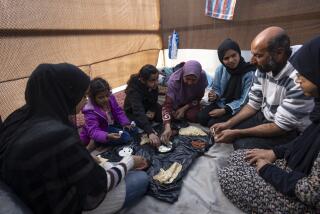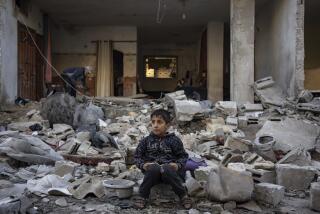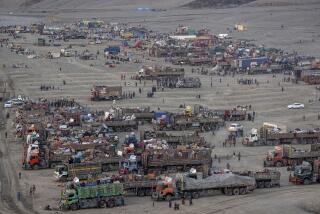Pakistan closes border, except to the wounded
QUETTA, Pakistan — For Afghan refugees on the run from bombing, starvation and the approaching winter, the price for legally entering Pakistan has finally been established: a leg, an eye, an arm or a few pints of blood.
You must come by ambulance, in other words, or you won’t make it more than a few hundred yards, especially now that Pakistani officials have restated their determination to keep the border closed.
So, the few who make it with the blessing of the authorities tend to be like 11-year-old Saad Mohammad, who eight days earlier had his right foot blown off by a bomb blast during a morning airstrike as he walked outside his house near Kandahar. His sister Parmeen, 7, suffered hand injuries.
Their father, Tajmah Mohammad, bandaged the children as well as he could and drove 19 hours to Sandeman Municipal Hospital in Quetta, arriving at 3 o’clock the next morning. He figured it was the best place within driving range, but the 11-bed ward where the children landed, with its grimy walls, tattered blankets and chipped concrete floor, seems like scant reward for his efforts.
Saad, wide-eyed and silent, lay barely stirring in his bed while flies landed on his face and bandaged leg. A handwritten strip of paper posted behind his bed charts the erratic progress of a stubborn fever. The hospital doesn’t provide food, so his father orders plates of flat bread and rice from a small hotel across the street.
Mohammad says that their home village is not the sort of place to be bringing up children.
“There are no schools. They cannot read and write, none of them,” he says. “There is no work. Before this, there were no attacks. America just wants Osama [bin Laden], but we are innocent people. They’re doing all this just to find one man.”
But he says that he left behind six other children and that as soon as doctors discharge Saad and Parmeen, they’ll return.
“Afghanistan is our home,” Mohammad says. “We will go back.”
His intentions align with new government policies outlined here Sunday by the province’s home secretary, Azmat Hanif Orakzai: Refugees who need treatment will get it, then go home. Those staying in tents at relief camps a few hundred yards inside Pakistan will be sent home “as soon as the situation improves in Afghanistan.” Future arrivals will be shunted to new camps in Afghanistan, “so they do not cross over.” And refugees who have sneaked across the border illegally will be rounded up and sent to border camps.
The latter measure will be the toughest to enforce and is the most controversial. Peter Kessler, a spokesman here for the United Nations High Commissioner for Refugees, says up to 135,000 Afghans have filtered into Pakistan illegally since Sept. 11, crossing on foot through mountain passes or across the desert. Others have bribed their way in.
These arrivals head for more established refugee camps near Pakistani cities such as Quetta and Peshawar - sprawls of mud huts, where residents cook over wood fires and sewage runs in open trenches. Others disappear into crowded city centers, where exile populations now dominate.
“We don’t want to see people rounded up and forced to go someplace they don’t want to go,” Kessler says, adding that the United Nations is willing to provide relief supplies, no matter where refugees might be staying.
But Orazkai insisted Sunday that “we will try to locate them. ... We are already on the job.”
In Afghanistan, World Food Organization officials seem optimistic that they can avert famine this winter, now that they’re running truck convoys into Afghanistan on five main routes.
“We’ve got the trucks, we’ve got the food and we’ve got the funds. It’s just a matter of orchestrating it,” says Lindsey Davis, a WFO spokeswoman in Islamabad.
She says trucks are carrying 2,000 tons of food a day into the country, slightly more than the 52,000 tons per month needed to meet the needs of about 6 million people.
More to Read
Sign up for Essential California
The most important California stories and recommendations in your inbox every morning.
You may occasionally receive promotional content from the Los Angeles Times.










